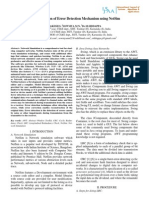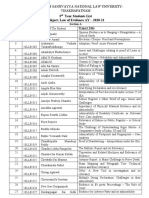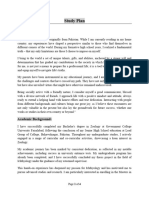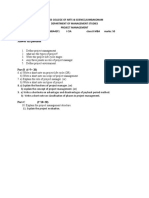Topic: The Impact of Social Media on Mental Health
Main Ideas:
1. Social Media Usage Trends: Overview of how social media has become ubiquitous,
especially among young people.
2. Positive Effects: Exploration of the potential benefits, such as social support and
connection.
3. Negative Effects: Examination of adverse outcomes, including anxiety, depression, and
body image issues.
4. Comparative Studies: Analysis of research findings that illustrate differing impacts
based on demographic factors.
5. Mitigation Strategies: Discussion on ways to reduce negative impacts, including digital
literacy and mindful usage.
The Impact of Social Media on Mental Health
Social media has transformed communication, connecting billions worldwide and reshaping
interactions among individuals. As platforms like Facebook, Instagram, and Twitter become
integral to daily life, understanding their impact on mental health is critical. Research indicates
that while social media can provide benefits, it also poses significant risks, particularly for
vulnerable populations such as adolescents and young adults.
The rise of social media is notable; as of 2021, 90% of adolescents reported using social media
regularly (Pew Research Center, 2021). This widespread usage creates opportunities for social
support and community building, which can be beneficial for mental well-being. According to
Seabrook, Kern, and Rickard (2016), social media can foster feelings of belonging and enhance
social connections, leading to increased happiness and reduced feelings of isolation. These
platforms allow users to maintain relationships and seek support, particularly during challenging
times.
However, the negative effects of social media cannot be overlooked. Numerous studies link
excessive social media use to increased levels of anxiety, depression, and loneliness (Keles,
McCrae, & Grealish, 2020). The comparison culture prevalent on these platforms often leads to
body image issues and self-esteem problems, particularly among adolescents. For instance, a
study by Perloff (2014) found that young women who frequently engage with social media are
more likely to experience body dissatisfaction, leading to mental health challenges. Furthermore,
cyberbullying and negative interactions online can exacerbate feelings of anxiety and depression,
creating a vicious cycle of distress.
Research has also highlighted the importance of demographic factors in understanding the
impact of social media. For instance, Vannucci et al. (2017) discovered that while social media
can enhance social support among some groups, it may exacerbate feelings of isolation and
�anxiety in others, particularly those with pre-existing mental health conditions. This underscores
the need for a nuanced approach to understanding social media’s role in mental health.
To mitigate the negative impacts of social media, several strategies can be employed. Promoting
digital literacy is essential; individuals should be educated about healthy social media usage and
encouraged to engage mindfully with these platforms. Additionally, fostering environments
where young people feel empowered to seek help and communicate openly about their
experiences online can further support mental well-being (Frison & Eggermont, 2015).
In conclusion, social media's impact on mental health is multifaceted, presenting both
opportunities and challenges. While it can enhance social connections and provide support, it
also risks contributing to anxiety, depression, and self-esteem issues. Future research should
continue to explore these dynamics, particularly focusing on developing effective interventions
to harness social media's positive aspects while minimizing its potential harm.
References
Frison, E., & Eggermont, S. (2015). Exploring the relationships between Facebook use and
adolescents' life satisfaction: A multilevel approach. Computers in Human Behavior, 54, 53-60.
Keles, B., McCrae, N., & Grealish, A. (2020). A systematic review: The impact of social media
on the mental health of young people. The Australian & New Zealand Journal of Psychiatry,
54(1), 36-46.
Perloff, R. M. (2014). Social media effects on young women’s body image concerns: Theoretical
perspectives and an agenda for research. Sex Roles, 71(11-12), 363-377.
Pew Research Center. (2021). Social Media Use in 2021. Retrieved from
https://www.pewresearch.org
Seabrook, E. M., Kern, M. L., & Rickard, N. S. (2016). Social networking sites, depression, and
anxiety: A systematic review. JMIR Mental Health, 3(4), e50.
Vannucci, G., Flannery, K. M., & Ohannessian, C. M. (2017). Social media use and anxiety in
adolescents: A longitudinal study. Journal of Adolescence, 55, 191-196.






















































































